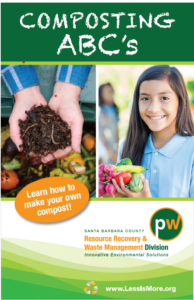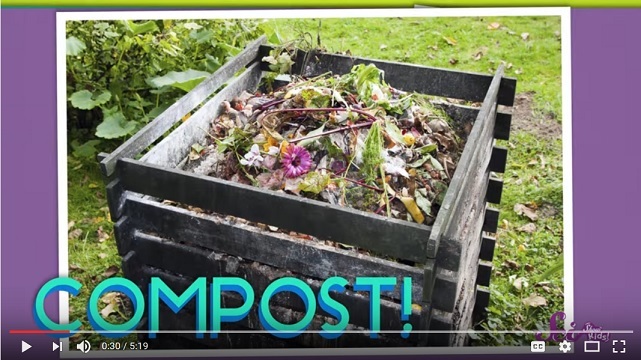
Composting at Home
Composting is nature's way of recycling. Yard waste and food waste are broken down and become food for plants. This page contains general information about composting at home, including links to the other pages related to composting.
Updated Composting Booklet Now Available!
In our newly updated waste reduction and composting booklet, we take waste reduction to a whole new level...in a very easy way. If you're interested in learning how to reduce your food and yard waste, and also learn different methods of composting, this is the booklet for you!

Download the PDF in English or Spanish, or contact us if you'd like a hard copy (Santa Barbara County residents only please).
What is composting?
Composting is just another form of recycling. When you compost, you're tapping into the natural nutrient cycle. In nature, organic waste from plants and animals is recycled by decomposition. Composting is controlling that decomposition to speed it up and produce a stable and odorless material for plants to use.
Click here to watch this great composting video for kids. (Adults will like it, too!)
Why compost?
Composting your kitchen scraps and yard waste at home can help divert material from your local landfill and provide a good quality product for use in your yard and garden. Home composting is both fun and easy to do, and does not require large investments of time, money, or effort to be successful. Read more on our Benefits of Composting page.
What about compost bins?
You don't need a compost bin to compost, but the County offers a discounted composting bin program if you want a more contained system. We offer two composters: bins that are made by Earth Machine and are sold for $55.00 each (price includes tax), and smaller vermicomposters made by FCMP that are sold for $50.00 each. Learn more about our discounted compost bin sale.
An even less expensive approach is to simply maintain an open compost pile in your yard. You can also construct a compost enclosure from a variety of materials. Find more information in our composting booklet below.
Are other types of bins available?
Commercial composting bins are generally available at local nurseries, feed stores, garden shops, and home improvement stores. Depending on the model, costs vary from $25 to $300, though most sell in the $50 to $125 range. Check out where to buy composting bins on our Retail Compost Bins Page.
What about worm composting?
If you live in an apartment or condominium, or don't generate yard waste, you might consider vermicomposting for your kitchen scraps. Vermicomposting uses red worms in a small container to convert your fruit and vegetable peelings into a nitrogen-rich compost product that is perfect for house plants and planter boxes. Starting in 2026, the County now offers vermicomposters for sale at-cost that you can use if you live in a small space such as an apartment or condo. Read more on our Vermicomposting page.
Check out our Composting ABC's and Food Forward booklets!
Our newly updated Composting ABC's is available as a PDF in English or Spanish. Also check out our latest publication, Food Forward: Reduce Your Food Waste.
If you live in Santa Barbara County and would like a hard copy of either booklet, contact us and we'll send you one. Please don't forget to include your mailing address!
And attend one of our free workshops
County staff holds free year-round backyard composting workshops. Read more about them on our Compost Workshop page. Or have your composting questions answered by calling (805) 882-3618 or contacting us. Just give us a little time to respond!
Can't make a workshop? Check out the video below that we created with our partners at Explore Ecology.
Where to go
-
Santa Barbara Area (3)
- *South Coast Recycling and Transfer Station — 4430 Calle Real
- La Sumida Nursery — 165 South Patterson Avenue
- Santa Barbara Home Improvement Center — 415 East Gutierrez Street
-
Goleta & UCSB Area (1)
- Island Seed and Feed — 29 South Fairview Avenue
-
Santa Ynez Valley (1)
- Farm Supply Company — 700 McMurray Rd
-
Lompoc Valley & VAFB (1)
- City of Lompoc Corporate Yard — 1300 W. Laurel Ave
-
Santa Maria Valley (2)
- *North County Public Works Building — 620 W Foster Road
- Farm Supply Company — 1920 North Broadway
-
Outside Santa Barbara County (2)
- Hayneedle —
- Planet Natural Garden Supply — 1612 Gold Avenue
Related Materials
- Yard Waste Reduction
- Agricultural Waste Recycling
- Outreach Materials
- Recycling Resource Guide
- Agricultural Plastic Recycling
- Green Cart Recycling
- Vermicomposting
- Retail Compost Bins
- Manure Recycling Program
- Discount Compost Bins
- Benefits of Composting
- Composting Workshops
- Mulch Program
- ReSource Center and Tajiguas Landfill Tours
- SB 1383 Edible Food Recovery
- SB 1383 & Non-Local Entity Requirements
- Santa Barbara County Regional SB 1383 Food Recovery Plan
- Setting Up a Food Recovery Plan
- Online Recordkeeping System FAQs
- SB 1383 Edible Food Recovery Tools
- Waste Reduction in Action!
Related Articles
-
Christmas Tree Recycling
December 26, 2023 by Kaitlyn Haberlin - Organics -
Keep Your Waste in Check This Holiday Season
December 21, 2018 by Leslie Robinson - Reduce & Reuse -
“Less Is More” Guide Hot Off the Press
January 18, 2023 by Kaitlyn Haberlin - Recycle, Reduce & Reuse -
America Recycles Day November 15th
November 08, 2019 by Leslie Robinson - Recycle -
Compost Your Pumpkins (and other organics)!
November 01, 2019 by Sam Dickinson - Organics -
World Food Day October 16
October 09, 2018 by Leslie Robinson - Organics -
County Programs Available to Reduce Organic Waste
April 09, 2018 by Sam Dickinson - Organics -
RRWM’s Annual Waste Management Report Now Available
October 05, 2017 by Alan Nakashima - Recycle -
County Awarded for Excellence in Solid Waste Management
August 15, 2017 by Tom Chiarodit - Recycle -
Mini Composting Workshops this Thursday at SBCC’s Earth Day Event
April 17, 2017 by Sam Dickinson - Organics -
Taking a Further Look at Food Waste
September 05, 2014 by Leslie Robinson - Organics -
Learn the Composting ABC’s
April 15, 2014 by Sam Dickinson - Organics -
County Mulch Available for Drought Relief
February 13, 2014 by Tom Chiarodit - Organics -
Redefining Waste Recovery
June 03, 2019 by Carlyle Johnston -
New Food Forward Booklet Available!
August 21, 2019 by Sam Dickinson -
New Food Forward Booklet!
July 30, 2023 by Kaitlyn Haberlin - Organics -
2019/2020 Resource Recovery Waste Management Annual Report Now Available!
January 11, 2021 by Tori Kampmann -
County’s ReSource Center Is Helping Many Residents Recycle their Organics
January 20, 2022 by Kaitlyn Haberlin - Organics -
Mulch Program Updates!
March 14, 2022 by Kaitlyn Haberlin - Organics -
2023/2024 Resource Recovery Waste Management Annual Report
February 12, 2025 by Owen Walsh -
Composting Workshop at the Solvang Library!
May 19, 2022 by Mackie Forgey - Organics -
Screen Your Green (bin)!
September 01, 2024 by Kaitlyn Haberlin - Organics -
Check Out RRWM’s New Waste Reduction and Recycling Calendar for 2025!
January 03, 2025 by Kaitlyn Haberlin - Reduce & Reuse -
Say Hello to Vermicomposters!
January 21, 2026 by Elizabeth Braun
